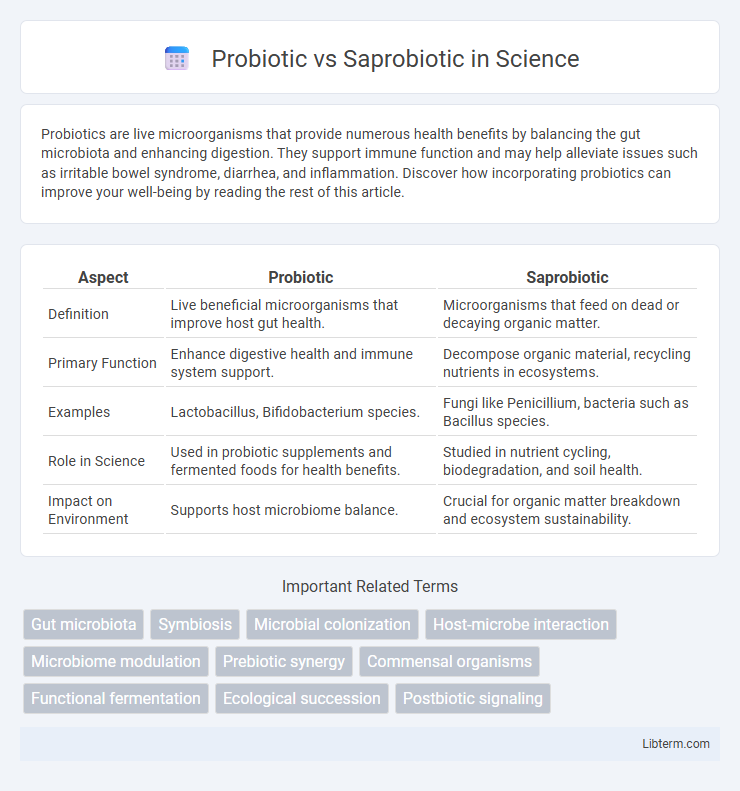Probiotics are live microorganisms that provide numerous health benefits by balancing the gut microbiota and enhancing digestion. They support immune function and may help alleviate issues such as irritable bowel syndrome, diarrhea, and inflammation. Discover how incorporating probiotics can improve your well-being by reading the rest of this article.
Table of Comparison
| Aspect | Probiotic | Saprobiotic |
|---|---|---|
| Definition | Live beneficial microorganisms that improve host gut health. | Microorganisms that feed on dead or decaying organic matter. |
| Primary Function | Enhance digestive health and immune system support. | Decompose organic material, recycling nutrients in ecosystems. |
| Examples | Lactobacillus, Bifidobacterium species. | Fungi like Penicillium, bacteria such as Bacillus species. |
| Role in Science | Used in probiotic supplements and fermented foods for health benefits. | Studied in nutrient cycling, biodegradation, and soil health. |
| Impact on Environment | Supports host microbiome balance. | Crucial for organic matter breakdown and ecosystem sustainability. |
Introduction to Probiotics and Saprobiotics
Probiotics are live microorganisms that confer health benefits when consumed in adequate amounts, mainly by enhancing the gut microbiota balance and supporting digestive health. Saprobiotics, in contrast, are non-living microbial derivatives or metabolites that promote health by modulating immune responses and maintaining intestinal barrier function without containing viable organisms. Understanding the distinct mechanisms of probiotics and saprobiotics is essential for optimizing their use in nutritional and therapeutic applications.
Defining Probiotics: What Are They?
Probiotics are live microorganisms, primarily bacteria and yeasts, that provide health benefits when consumed in adequate amounts by promoting a balanced gut microbiota and enhancing digestive health. These beneficial microbes are commonly found in fermented foods such as yogurt, kefir, and sauerkraut, or in dietary supplements formulated to support immune function and nutrient absorption. Unlike saprobiotics, which decompose organic matter, probiotics actively interact with the host's microbiome to improve intestinal flora and prevent pathogenic bacterial growth.
Understanding Saprobiotics: A New Concept
Saprobiotics represent a novel class of probiotics that focus on utilizing non-living microbial components to promote gut health, differing from traditional probiotics that rely on live bacteria. These inactive microbial cells or extracts enhance the immune system and support intestinal balance without the risks associated with live microorganism consumption. Emerging research highlights saprobiotics' potential in reducing inflammation and improving digestive health through bioactive compounds derived from dead microbes.
Key Differences Between Probiotics and Saprobiotics
Probiotics are live beneficial microorganisms that colonize the gut and promote digestive health by balancing the intestinal flora, while saprobiotics are organisms that feed on decaying organic matter, contributing to nutrient recycling in ecosystems. Probiotics primarily target improving human health through competitive exclusion of pathogens and enhancement of immune function, whereas saprobiotics function in environmental decomposition and soil fertility. Key differences include their ecological roles, with probiotics focusing on host health in symbiotic relationships and saprobiotics operating independently in nutrient breakdown processes.
Mechanisms of Action: Probiotics vs Saprobiotics
Probiotics exert their beneficial effects by colonizing the gut, producing antimicrobial substances, and modulating the host immune response to enhance gut barrier function. Saprobiotics primarily act through the biodegradation of organic matter, facilitating nutrient recycling and maintaining soil microbial balance without directly colonizing the host. The mechanisms of action contrast as probiotics interact with host physiology, while saprobiotics function through environmental decomposition and nutrient transformation processes.
Health Benefits of Probiotics
Probiotics are live microorganisms that provide significant health benefits by improving gut flora balance, enhancing digestion, and boosting the immune system. Unlike saprobiotics, which decompose organic matter, probiotics actively support digestive health, reduce inflammation, and may alleviate symptoms of irritable bowel syndrome (IBS) and diarrhea. Clinical studies highlight probiotics' role in promoting nutrient absorption and maintaining a healthy microbiome, essential for overall wellness.
Health Benefits of Saprobiotics
Saprobiotics, unlike traditional probiotics, utilize beneficial saprophytic bacteria that break down dead organic matter, enhancing gut detoxification and promoting a balanced microbiome. These microorganisms support immune function by reducing harmful pathogen overgrowth and improving nutrient absorption, leading to better overall digestive health. Emerging studies highlight saprobiotics' role in reducing inflammation and oxidative stress, contributing to long-term wellness beyond typical probiotic effects.
Choosing the Right Supplement: Factors to Consider
Choosing the right supplement involves understanding the distinct roles of probiotics and saprobiotics in gut health; probiotics introduce beneficial live bacteria that aid digestion and immune function, while saprobiotics support the growth of these beneficial bacteria by providing essential nutrients. Key factors to consider include the specific strains of bacteria in probiotics, their viability, and the prebiotic components in saprobiotics that enhance microbial balance. Quality of ingredients, product formulation, and targeted health benefits are critical for selecting an effective supplement tailored to individual digestive needs.
Safety and Potential Side Effects
Probiotics, containing live beneficial bacteria, are generally safe for healthy individuals but may cause mild digestive discomfort or rare infections in immunocompromised patients. Saprobiotics, which rely on dead or inactivated microbes to support gut health, present a lower risk of infection and are considered safer for vulnerable populations. Both require proper strain identification and dosage to minimize potential side effects and ensure optimal therapeutic effects.
Conclusion: Which is Better for Gut Health?
Probiotics introduce beneficial live microorganisms that actively restore gut flora balance, whereas saprobiotics utilize enzymes to break down dead organic matter, indirectly supporting digestive processes. For direct enhancement of gut microbiota diversity and immune modulation, probiotics demonstrate superior efficacy. Selecting the optimal approach depends on individual digestive health needs, but probiotics generally offer more targeted benefits for gut health restoration.
Probiotic Infographic

 libterm.com
libterm.com